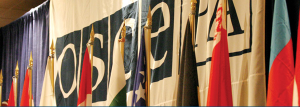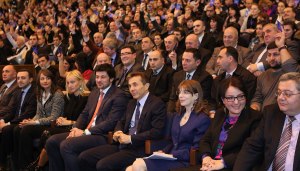 Raffi Hovhannessian was the only mainstream Armenian opposition politician who at the end of last year decided to throw his hat into the election ring. He conducted a campaign that verged on the surreal – avoiding controversy, shaking hands, talking of serenity and unity. Some said that fools rush in where angels fear to tread; others accused him of legitimising with his candidature a flawed process; others dismissed him as irrelevant. He could have been any of these three things, or even all of them, but in any case it now does not matter. Whether the 539,691 Armenians who voted for him did so because they liked him or his programme, or because they were voting against the incumbent, we will never quite know. The issue now is not the election (if it ever was) but the political process, and Hovhanessian has emerged much stronger than any of the other opposition political leaders to play the leading role. After the election results were announced he was smart enough to understand that this was Raffi’s moment and he grabbed it with both hands, leaving both the government and the other opposition leaders confused and disorientated. More…
Raffi Hovhannessian was the only mainstream Armenian opposition politician who at the end of last year decided to throw his hat into the election ring. He conducted a campaign that verged on the surreal – avoiding controversy, shaking hands, talking of serenity and unity. Some said that fools rush in where angels fear to tread; others accused him of legitimising with his candidature a flawed process; others dismissed him as irrelevant. He could have been any of these three things, or even all of them, but in any case it now does not matter. Whether the 539,691 Armenians who voted for him did so because they liked him or his programme, or because they were voting against the incumbent, we will never quite know. The issue now is not the election (if it ever was) but the political process, and Hovhanessian has emerged much stronger than any of the other opposition political leaders to play the leading role. After the election results were announced he was smart enough to understand that this was Raffi’s moment and he grabbed it with both hands, leaving both the government and the other opposition leaders confused and disorientated. More…
Monthly Archives: February 2013
Election Monitoring: Is there a turf war between OSCE structures?

The decision of the OSCE Parliamentary Assembly Mission monitoring the Armenian Presidential Election last week to issue a separate statement at a separate Press conference from the rest of the joint international monitoring effort raised speculation about differences in the conclusions of the two groups. Asked about this during their Press Conference, the representatives of OSCE/ODIHR downplayed the issue and presented it as more of a technical decision rather than a political one. But was it? A few days later at the General Assembly of the OSCE PA in Vienna it was announced that “a committee of parliamentarians headed by Francois-Xavier de Donnea (MP, Belgium) will have the mandate to negotiate on behalf of the Assembly with the OSCE ODIHR regarding improved co-operation in future election observation missions.”
A statement on the OSCE PA website added: “The OSCE PA and the OSCE/ODIHR previously co-operated under a 1997 agreement that laid out the respective roles for the institutions and clarified that a parliamentarian appointed as special co-ordinator for the election observation mission would deliver the preliminary post-election statement on behalf of the OSCE. In December, after repeated challenges to that agreement that undermined appointed special co-ordinators, President Riccardo Migliori with support of the OSCE PA Bureau, declared the agreement no longer operable.”
There have been rumors for a number of years of problems between OSCE ODIHR and OSCE PA on election monitoring. For the sake of the credibility of the process this discussion now needs to be conducted with maximum transparency. More…
Armenian Elections: We have always known who the winner was going to be, but who are the losers?

Unofficial results in the Armenian Elections show a victory for the incumbent Serzh Sargsyan, with around 59% of the votes cast. Raffi Hovhanessian is runner up with around 37%
The 6th presidential Election of independent Armenia was held on Monday 18th February 2013. There was never any doubt who was going to win this election, but candidates, voters, election officials, journalists and observers – local and international, went through the necessary motions to conduct what technically was a good election ritual. A few of the seven candidates did not play the game according to the established rules and there was, a still unexplained, attempt on the life of another. One of the original eight candidates registered pulled out completely. The process was calm, peaceful, efficient and largely transparent. But while we always knew who the winner of this election was going to be, the question of who were going to be the losers was not always that clear. More…
The Georgian roller-coaster continues non stop.

Bidhzina Ivanishvili at the Congress of his Georgian Dream Party in Tbilisi on 16 February 2013.
Only days after Georgian politics plunged into pessimism with ugly scenes of intolerance in front of the National Library as President, Government and Parliament played a cat and mouse game which they insist on calling cohabitation, it was time for the roller coaster to turn on the up side. Reconciliation was in the air as the two sides pulled back from brinkmanship politics and focused instead on necessary compromise. The sight of two MPs, one from the government coalition and one from the opposition having a fist fight on live prime tv was not reassuring, but Georgians have got used to theatrics and are no longer much impressed by it.
Of more substance was the news that the Government and the opposition were edging closer to agreeing a constitutional settlement that would address the immediate concerns of the two sides. More…
If Brezhnev could accept the Helsinki Final Act of 1975, it should not be so difficult for Armenia and Azerbaijan to do so too.

Soviet Leader Leonid Brezhnev signing the Helsinki Final Act in August 1975. The Act made the subject of human rights a matter of legitimate concern to all.
Over the last few weeks it has become common to hear officials in Azerbaijan, and to a lesser extent in Armenia, complaining that the European Union is interfering in the internal affairs of their countries. This happens whenever EU officials or diplomats raise issues connected with human rights, rule of law and free elections. The chorus started first with some pro government journalists and commentators, but by last week senior officials in the two countries had joined the fray.
These officials clearly do not understand the processes that have been going on in Europe in the last forty years. The historic Helsinki Final Act adopted by all the European states (with the exception of Albania) in 1975 laid the foundation of a new European order which recognised the indivisibility of security and that human rights on the continent were not simply an internal matter but a matter of legitimate concern for all. More…
Thirty-two European governments express concern about human rights situation in Azerbaijan.
 At the 941st meeting of the Permanent Council of the Organisation for Security and Co-operation in Europe (OSCE) held in Vienna on Thursday, 14 February 2013 a statement was made on behalf of the twenty-seven member states of the European Union and on behalf of Croatia, Montenegro, Iceland, Bosnia-Herzogovina and the Former Yugoslav Republic of Macedonia who aligned themselves with it, expressing concern about recent developments in Azerbaijan in the field of human rights. More…
At the 941st meeting of the Permanent Council of the Organisation for Security and Co-operation in Europe (OSCE) held in Vienna on Thursday, 14 February 2013 a statement was made on behalf of the twenty-seven member states of the European Union and on behalf of Croatia, Montenegro, Iceland, Bosnia-Herzogovina and the Former Yugoslav Republic of Macedonia who aligned themselves with it, expressing concern about recent developments in Azerbaijan in the field of human rights. More…